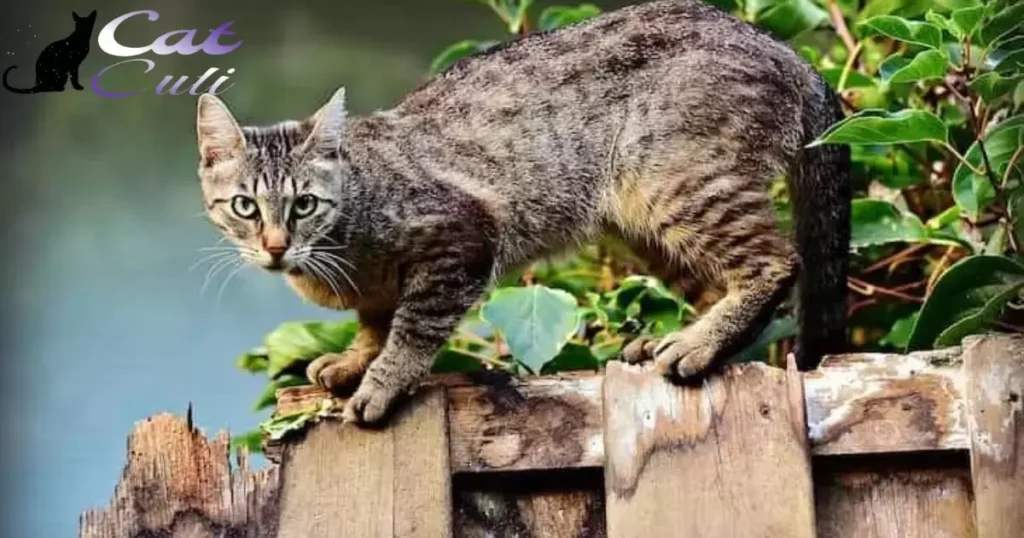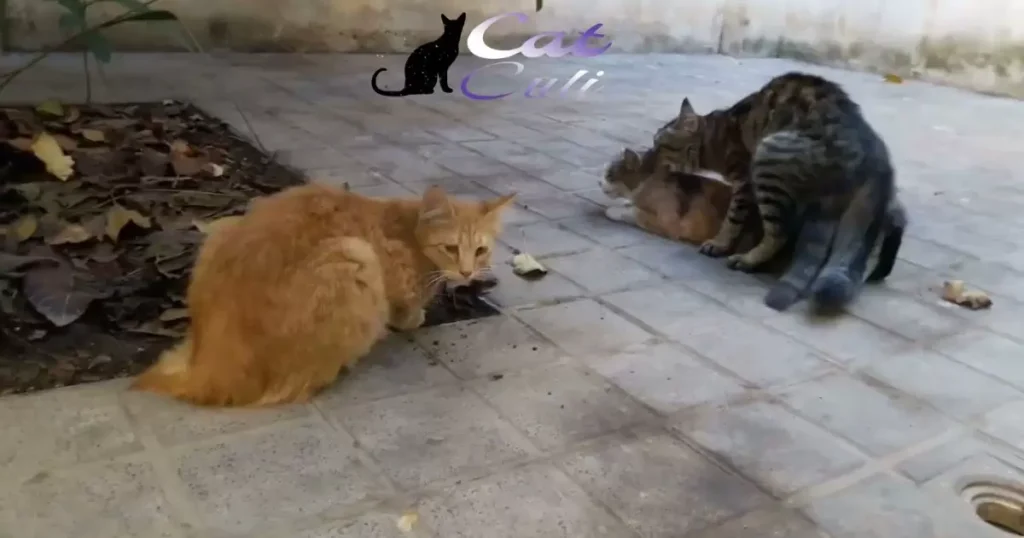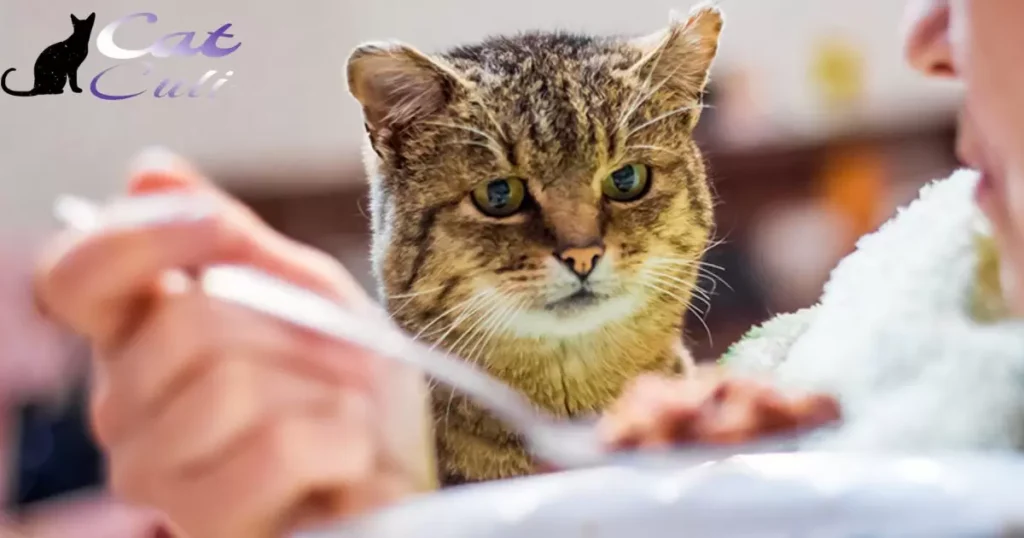Stopping your cat from begging for table food involves consistency. Firstly, avoid giving in to their begging. Secondly, feed them their meals at regular times. Provide engaging toys or treats to divert their attention. Finally, reinforce positive behaviour with praise or rewards.
Are you tired of constantly dealing with your cat’s persistent begging for table food? Discover effective strategies on how to stop your cat from begging for table food. Explore simple yet practical techniques that will help you enjoy mealtime without your feline friend’s persistent interruptions.
Learn the tricks to curb your cat’s begging for table scraps! Discover effective strategies to prevent this behaviour and maintain a peaceful mealtime atmosphere. Stay with us to explore simple methods that will help your cat kick the habit of begging for human food at the table.
Why Is My Cat Always Hungry?
Cats might always seem hungry due to several reasons. First, some breeds have a naturally higher appetite. Second, if your cat is active, they burn more energy and need more food. Third, health issues like diabetes or hyperthyroidism can increase hunger. Always check with a vet if your cat’s hunger seems excessive to rule out any underlying problems.
Another reason could be emotional or behavioural. Cats may use begging for food as a way to seek attention or alleviate boredom. Ensure they have engaging toys and spend quality time with them to address any emotional needs they might have, which might reduce their constant hunger cues.
Am I Feeding My Cat Enough During The Day?
If you wonder whether your cat gets enough food daily, check its behaviour. Observe if your cat seems constantly hungry or displays weight changes. Adjust the portion sizes if needed, ensuring they get enough without overeating. Consult your vet for tailored advice on your cat’s specific dietary needs.
When in doubt about your cat’s feeding, monitor their energy levels. An adequately fed cat will be active and content. Consider factors like age, weight, and activity level to determine the right amount of food for your feline friend. Regularly assess their feeding habits to ensure they’re receiving proper nutrition.
How To Break The Begging Habit
Breaking your pet’s begging habit starts with consistency. Ignore the begging behaviour and refrain from giving in to their demands for food scraps. Establish a consistent feeding schedule to meet their nutritional needs and discourage begging. Introduce interactive toys or treats to redirect their attention during meal times, fostering positive behaviours.
Consistency is key in breaking the begging habit. Ignore their pleas for table scraps and stick to a regular feeding routine. Introduce alternative distractions like toys or treats to redirect their focus away from begging during mealtime, reinforcing good behaviour over time.
How To Eat Without A Cat Begging
Keeping your cat from begging while you eat involves a few simple tricks. Firstly, feed your cat before you sit down to eat your meal. This ensures they’re satisfied and less likely to beg for your food.
Secondly, create a designated feeding area for your cat away from where you eat. This helps establish boundaries and reduces their interest in your food. Lastly, ignore begging behaviour and avoid giving in, as any attention or food reinforcement can encourage this habit.
When dining without your cat’s interference, consistency is key. Stick to a routine of feeding your cat before your mealtime and maintaining a separate eating area for them. Ignoring their begging signals and staying firm in not sharing your food will gradually discourage this behaviour, ensuring peaceful meals for both you and your furry friend.
Make Sure It’s Not A Bigger Problem

Firstly, ensure that your concern isn’t part of a more significant issue by observing the situation closely. Monitor your cat’s behaviour for any potential underlying health problems or other triggers. Address any health-related concerns promptly by consulting a veterinarian for a thorough check-up.
Rule out any environmental or stress-related factors that might be contributing to the behaviour. Create a calm and comfortable environment for your cat to alleviate any potential stressors. By actively observing and addressing potential underlying issues, you can ensure that it’s not a larger problem affecting your cat’s behaviour.
Why Cats Beg For Food
Cats beg for food because they’ve learned it gets results. When they meow or paw at us during meals, they’re seeking attention or hoping for a tasty treat. It’s often reinforced by our unintentional reward for sharing our food or giving them snacks when they beg.
Some cats might beg due to boredom or because they’ve associated our mealtime with their feeding schedule. Their instincts could also drive this behaviour as they may prefer certain scents or textures found in our food. Understanding these reasons can help redirect their behaviour and discourage begging during meals.
The 12 Tips To Get Your Cat To Stop Begging For Food
Struggling with your cat’s relentless begging for food? Here are 12 easy tips to curb this behaviour. Firstly, stick to a consistent feeding schedule to avoid unnecessary begging. Secondly, offer interactive toys or puzzles to keep your cat engaged and distracted during mealtime.
Thirdly, ignore the begging completely, ensuring no reinforcement for this behavior. To Make My Cat Less Food Obsessed, consider consulting a vet to rule out any underlying health issues causing excessive hunger. Discovering effective ways to manage your cat’s food begging starts with these 12 actionable tips.
Implementing a regular feeding routine and engaging your cat with toys can break the cycle of persistent begging. Ignoring the behaviour and seeking professional advice can contribute significantly to a more peaceful mealtime environment for you and your feline companion.
Start With A Trip To The Vet
Begin by scheduling a visit to the vet for your cat. This trip helps rule out any underlying health issues causing their behaviour. The vet can provide insights into your cat’s specific needs and offer guidance on addressing begging behaviour effectively.
Taking this step ensures you start with a clear understanding of your cat’s health before implementing any changes to their behavior.At the vet’s office, discuss your cat’s behaviour openly.
Your vet will conduct a thorough examination to identify any medical reasons behind their begging. They’ll offer tailored advice and strategies to curb this behaviour, ensuring a holistic approach to your cat’s well-being. Starting with a vet visit sets the foundation for addressing your cat’s begging for table food.
Break Up Mealtimes
| Mealtime Strategy | Description |
| Scheduled Feeding | Set specific meal times for your cat, providing consistency and structure to their day. |
| Puzzle Feeders | Use interactive toys or puzzle feeders to make mealtime more engaging and mentally stimulating for your cat. |
| Diversion Tactics | Employ distractions like toys or activities to redirect your cat’s attention away from begging during mealtimes. |
| Ignore Begging | Refrain from giving any attention or food when your cat begs, reinforcing that this behaviour won’t result in a reward. |
| Positive Reinforcement | Reward good behavior during mealtimes with treats or praise, encouraging your cat to associate positive actions with rewards. |
This table outlines various strategies to help break up mealtimes and address begging behaviour in cats.
Evaluate Your Cat’s Nutrition
Assessing your cat’s nutrition involves observing their diet closely. Monitor the types and amounts of food they consume daily. Ensure a balanced diet by choosing quality cat food with the right nutrients. Check with your vet for guidance on maintaining a healthy and appropriate feeding plan.
Regularly examining your cat’s nutrition is crucial for their overall well-being. Observe their eating habits and adjust their diet accordingly. Consult your veterinarian to create a suitable meal plan that meets your cat’s specific nutritional needs. This proactive approach helps ensure your cat maintains good health through a well-rounded diet.
Change Where You Feed Your Cat

Try altering your cat’s feeding spot to instigate a positive shift. Choose a new location that’s calm and separate from their usual begging spot. By relocating their feeding area, you encourage a disconnect between mealtime and the table, gradually reducing their desire to beg for your food.
This change can steer your cat toward a healthier feeding routine and diminish their habit of seeking table scraps. Moving your cat’s feeding area can make a significant impact. It creates a new association, disconnecting their meal from your dining space. Find a quiet, dedicated spot for their food and water bowls, separate from where you eat.
This shift helps break the link between your meals and their begging behaviour, promoting a more peaceful dining experience for both you and your feline friend.
6 Essential Tips To Nip Cat Begging Behaviour Before It Gets Worse
- Establish Consistent Feeding Times: Set regular meal schedules to discourage begging.
- Avoid Table Treats: Refrain from giving in to begging for table scraps to discourage the behaviour.
- Provide Engaging Toys: Keep your cat occupied with toys or puzzles during your mealtime.
- Designate a Feeding Area: Choose a separate spot for their meals away from the dining table.
- Use Positive Reinforcement: Reward good behaviour with praise or treats when they don’t beg.
- Consult a Vet: If begging persists, seek advice from a veterinarian for additional guidance.
Am I Feeding My Cat Sufficient Amounts Of Food Often Enough During The Day?
Make sure your cat gets enough food throughout the day by feeding them at regular intervals. Cats thrive on routine, so stick to a consistent feeding schedule. Split their daily portion into multiple smaller meals to ensure they’re adequately nourished and satisfied.
Monitor their weight and adjust the amount accordingly to keep them healthy and happy.It’s crucial to understand your cat’s dietary needs and feeding habits to maintain their well-being.
Feeding your cat on a set schedule prevents overeating or hunger, keeping them in optimal condition. By providing balanced portions throughout the day, you ensure they receive the right amount of nutrition at the right times, promoting a healthy and contented feline companion.
Cat Keeps Begging For Human Food
Is your cat constantly begging for your food? This behaviour often stems from curiosity or a desire for attention. To deter this habit, avoid giving in to their requests. Instead, establish a consistent feeding schedule for your cat and provide them with their own nutritious meals.
Enrich their environment with toys and activities to keep them entertained and less focused on your food. By actively engaging with your cat and redirecting their attention, you can discourage their persistent begging for human food.
How To Stop Cat From Begging For Food In The Morning
To halt your cat’s morning food begging, establish a consistent feeding routine. Offer meals at set times daily, avoiding feeding in response to their morning pleas. Engage your cat in play or interactive activities before breakfast to redirect their attention. Such measures help deter the habit of begging for food in the mornings.
Another effective tactic involves providing puzzle feeders or slow-feed bowls. These tools make mealtime more engaging and elongate the feeding process, reducing the urgency for morning food begging. By incorporating these techniques into your routine, you’ll help your cat break the habit of persistently begging for food in the mornings.
Cat Begs For Food When Bowl Is Full
When your cat begs for food despite a full bowl, it seeks attention or prefers fresh meals. Cats might crave interaction or enjoy the novelty of freshly served food. To address this, offer stimulating play or affection instead of additional food. Keeping mealtime consistent helps curb this behaviour.
Consider dividing meals into smaller portions throughout the day for a sense of novelty.A cat begging for food despite a full bowl may simply desire companionship or a change in their routine.
They might perceive the bowl as stale or prefer interaction during mealtime. Combat this behaviour by engaging them in play or providing attention, offering an alternative to seeking more food. Also, try rotating their food or adding a variety to their diet to keep their interest piqued and discourage begging.
Old Cat Constantly Begging For Food
Does your senior cat constantly beg for food? This behaviour might signal various reasons such as increased appetite due to ageing or even boredom. One solution involves adjusting their meal portions while maintaining a consistent feeding schedule.
Consider enriching their environment with toys or interactive feeders to alleviate their urge to beg for extra food.Senior cats often beg due to changing nutritional needs or seeking attention.
Addressing this involves consulting your vet to ensure their diet matches their age and health. Offering affection and playtime can distract them from incessant begging. Modifying their feeding routine and providing stimulation can help your older cat feel satisfied without the need to beg for more food.
Cat Begging For Food After Eating

Does your cat beg for food right after eating? This behaviour often indicates habitual or psychological reasons rather than genuine hunger. Cats may beg due to boredom, seeking attention, or simply out of habit.
Address this by sticking to a consistent feeding schedule, providing ample playtime and mental stimulation, and offering affection and attention at designated times to discourage begging after meals. Understanding the root cause and implementing a routine can help break this cycle of post-meal begging in your cat
Cat Cries For Food Constantly
When your cat constantly cries for food, it’s vital to address this behaviour promptly. Begin by establishing a consistent feeding schedule to meet their needs. Also, ensure their meals contain adequate nutrition to keep them satisfied longer, reducing the urge to beg incessantly.
Introduce engaging toys or activities to distract your cat from fixating on food, encouraging a more balanced approach to their daily routine.Constant cries for food from your cat signal a need for attention. Take proactive steps by offering affection, playtime, or interaction outside meal hours to alleviate their constant hunger requests.
Consult your vet to rule out any underlying health issues contributing to their persistent behaviour. With patience and a structured approach, you can help your cat find contentment and reduce their constant cries for food.
FAQ’s
How do I get my cat to stop begging for food?
Set a consistent feeding schedule, offer engaging toys, and ignore begging behaviours to discourage them.
How do I get my cat to stop eating table food?
Avoid giving table scraps, provide nutritious meals, and redirect attention with toys.
Why does my cat beg for human food so much?
Cats beg due to attention-seeking behaviour or dissatisfaction with their diet.
Is it normal for my cat to beg for food all the time?
Frequent begging may signal hunger, boredom, or an underlying health issue.
Conclusion
In conclusion, understanding and implementing effective strategies on How To Stop Your Cat From Begging For Table Food? can transform mealtime dynamics. Consistency in feeding schedules, providing balanced nutrition, and offering engaging alternatives play pivotal roles in curbing this behaviour.
It’s a process that requires patience. With perseverance and a structured approach, you can successfully train your cat to enjoy their own meals without incessantly begging for table scraps. Fostering healthier habits not only improves your cat’s well-being but also enhances the bond between you and your furry companion.








